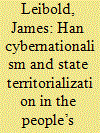| Srl | Item |
| 1 |
ID:
167626


|
|
|
|
|
| Summary/Abstract |
State control of land plays a critical role in producing land dispossession throughout the Global South. In Myanmar, the state’s approach towards territorial expansion has driven the country’s system of land governance, resulting in widespread and systemic land grabbing. This article investigates ongoing land governance reforms as key terrains for contesting such abuses of power. Employing a relational land governance approach, we view reform processes as shaped by changing power-laden social relations among government, civil society, and international donor actors. Legal and regulatory reforms in Myanmar potentially act as sites of meaningful social change but in practice tend to maintain significant limitations in altering governance dynamics. Civil society organizations and their alliances in Myanmar have played an important role in opening up policy processes to a broader group of political actors. Yet, policies and legal frameworks still are often captured by elite actors, becoming trapped in path dependent power relations.
|
|
|
|
|
|
|
|
|
|
|
|
|
|
|
|
| 2 |
ID:
144072


|
|
|
|
|
| Summary/Abstract |
Han majority nationalism poses a significant yet under-theorized challenge to state sovereignty and territorial integrity in China, especially in the era of the Internet. By shifting our focus from minority secessionist movements on the ground in Xinjiang and Tibet to a group of Han nationalists active in cyberspace, this article probes the friction between three distinct yet interrelated ideologies of spatiality in contemporary China: the processes and practices of state territorialization; counter-narratives and geographies of Han cybernationalism; and the transnational flows of the Sinophone Internet. It argues that the Internet empowers yet ultimately blunts the threat of Han nationalism, rendering it largely impotent when faced with the hegemony of state territorialization.
|
|
|
|
|
|
|
|
|
|
|
|
|
|
|
|